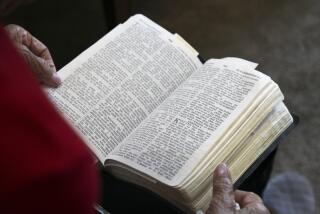Phrasing Viewed as Less Biased, More Traditional : Catholics Publish New American Bible
- Share via
WASHINGTON — America’s Roman Catholic bishops published a new Bible translation Saturday, edging away from language seen as biased against women but at the same time moving to more traditional phrasing in general.
The result is a Bible that often sounds less like the modernized 1970 translation it is replacing than it does the familiar, centuries-old King James Version used by many Protestants--but without the constant use of “man” or “men” when referring to people of unknown sex.
God and Jesus are still male in all references.
The editors, in a pre-publication interview, acknowledged they would not please everyone. But many of their changes were aimed at objections of Catholics who have complained that the earlier version of the church’s basic book retained discriminatory language or lacked accuracy and beauty of expression.
In one other area of controversy, in a passage listing people who the Bible asserts will not inherit the kingdom of God, the new version includes “boy prostitutes nor practicing homosexuals” rather than the 1970 version’s “sodomites.”
A Vatican statement last October said bishops should be more aggressive in stamping out pro-homosexual views within the church. But the committee of priests that put together the new translation said their work had been approved in March, 1986, and the more detailed wording was truer to the Greek original.
The overall revision covers the New Testament portion of the U.S. church’s New American Bible and should find its way into Catholic services over the next two years.
On the issue of discriminatory language, using two examples from well-known passages in the Gospel of Matthew:
--The 1970 version says, “Not on bread alone is man to live,” while the new translation says, “One does not live by bread alone.”
--The old version says, “Your light must shine before men,” while the new one says, “Your light must shine before others.”
On a broader scale, the new translation sounds more familiar than the 1970 version. For example:
--The 1970 translation of the Gospel of Luke says Mary and Joseph went to a stable for Jesus’ birth “because there was no room for them in the place where travelers lodged.” The new version says “because there was no room for them in the inn.”
--In the Beatitudes in the Gospel of Matthew, the 1970 version says, “How blest are the poor in spirit: the reign of God is theirs.” The new translation has the traditional, “Blessed are the poor in spirit, for theirs is the kingdom of heaven.”
The 1970 version might be described as the result of an effort to find “a dynamic equivalency to the original text,” said Msgr. Myles M. Bourke, professor of Scripture at St. Joseph’s Seminary in Yonkers, N.Y., and a member of the editorial board for the new translation.
More to Read
Sign up for Essential California
The most important California stories and recommendations in your inbox every morning.
You may occasionally receive promotional content from the Los Angeles Times.












